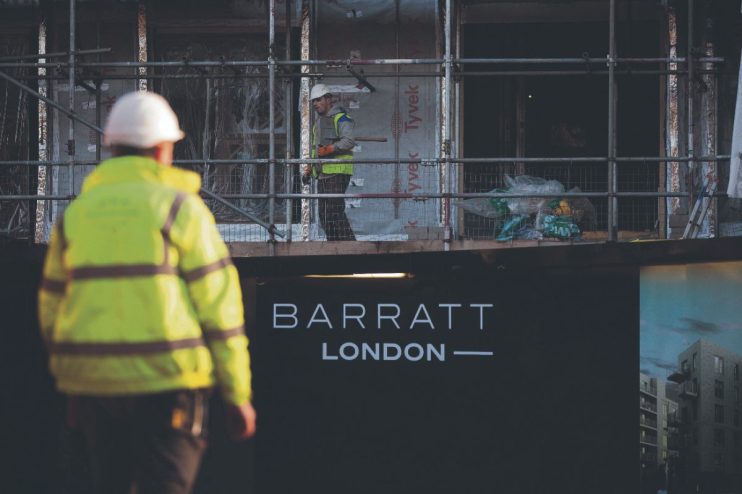Barratt: Profit halves at housebuilder but firm optimistic after Redrow deal

Housebuilder Barratt reported a halving in profit and drop in completions amid a challenging housing market, but has said it is optimistic about the future.
Barratt said its total home completions in the year ended 30 June reached 14,004, down 18.6 per cent from 17,206 in 2023 but at the upper end of the company’s expectations.
The fall has come despite respite from soaring building costs and Labour’s pledge to cut planning red tape.
The company reported adjusted gross profit of £689.0m, down 56.4 per cent from £1.13.4bn in 2023, due to “lower home completions and average selling prices, reduced margin due to site based fixed cost levels and build cost inflation,” it said.
Adjusted profit before tax was £385m, down from £884.3m in 2023, which was at the upper end of Barratt’s guidance.
Britain’s biggest housebuilder had been expected to report a fall in home completions and profits ahead of previous expectations.
The housing market has been subdued amid affordability constraints, although Barratt said that underlying demand in the UK remained “strong”.
David Thomas, chief executive of Barratt Developments said: “We are pleased to have delivered total home completions at the upper end of our expectations for the year, despite the challenging backdrop.
“We were delighted to complete the acquisition of Redrow in August and are now working constructively with the CMA to finalise competition clearance so that we can begin the integration process.”
After three months of investigation by the CMA, the watchdog has said it considers that there are reasonable grounds for believing that the deal will be approved after a series of compromises were put forward by Barratt and Redrow.
The CMA has until 18 October to decide whether to accept the changes or refer the deal to a phase two investigation.
Thomas added: “Whilst demand continues to be sensitive to mortgage affordability, and reduced land buying activity during the past two years has had a near-term impact on the number of outlets we are operating from, we are well-positioned to meet the strong underlying demand for new homes of all tenures in the UK.
“We welcome the Government’s proposed reforms of the planning system as one of the key levers to increase housebuilding, drive economic growth and tackle the chronic undersupply of high-quality, sustainable homes.”
Chancellor Rachel Reeves has said the Government will restore mandatory housebuilding targets for local authorities as part of the drive to build 1.5 million homes over five years, which is expected to help builders.
Other major UK housebuilders Vistry and Berkeley group are also set to report results this week.
Oli Creasey, property research analyst at Quilter Cheviot, said: Barratt Developments has announced a set of full year results this morning that contains very few surprises for a major housebuilder. Slow sales rates and falling operating margins are hampering Barratt, along with a number of other UK housebuilders.
“What is most notable is the guidance for the year ahead. Management expects housing completions to be 5 per cent lower next year, in a range of 13-13,500, vs 14,000 this year, which is the opposite direction of travel to what we’d expect.
“The company has justification for this – it is intentionally opening fewer outlets next year, partly to reflect demand but also the recent land-buying volumes, which have also been low).
“The indication is that sales per outlet figure should improve, but only marginally, again by around 5 per cent. So, while the bottom of the trough in the housing market seems to have been found, it may take another year to return to meaningful growth, or at least for Barratt.”
Richard Hunter, Head of Markets at interactive investor, said: “There is an element of kitchen-sinking to these numbers as Barratts has revealed the true extent of a difficult year.
“The group has to hope that this also marks an inflection point. It has confidence in its future prospects, which should be given fresh impetus by the acquisition of Redrow, a deal which is now all but over the line.
“The acquisition is a clear statement of intent, which should come with annual cost synergies of £90m by year three and a combined land pipeline of over 92000 plots, which would give the new entity significant firepower as and when economic constraints abate.
“There are some signs of an improving economic backdrop, the group keeps a sharp focus on factors within its control and the Redrow deal could be transformative if the element of integration risk over the next couple of years is successfully navigated.”
Julie Palmer, partner at Begbies Traynor, said: “Labour’s plans to reinvigorate housebuilding, potentially with changes to planning rules, look set to lay the groundwork for Barratt, and the wider sector, to boost output.
“The promising sounds from the Government, coupled with a more favourable macroeconomic backdrop, including an initial cut to interest rates and decrease in building cost inflation, should leave Britain’s biggest housebuilder well placed to deliver sustainable growth.
